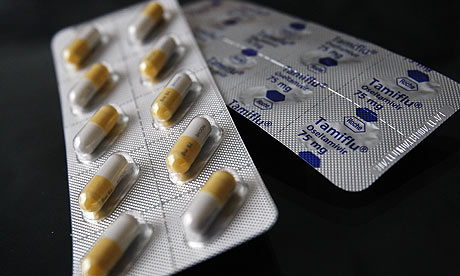
The following correction was printed in the Guardian's Corrections and clarifications column, Saturday 18 July 2009
The news story below said that the total of those diagnosed with swine flu in England rose by 42% - from 51.88 cases to 73.42 cases per 100,000 people - in the seven days up to 12 July. But the 51.88 figure, it turned out, had been issued in error. It should actually have been 50.3 cases, making the increase 46%.
The number of people diagnosed with swine flu soared almost sixfold during the course of last week in some parts of England, NHS figures revealed today.
The virus is spreading fast across much of the country and the total of those affected rose by 42% in the seven days up to last Sunday, according to data provided by family doctors.
Information collected by the Royal College of General Practitioners' research and surveillance centre in Birmingham, which monitors communicable and respiratory disease, shows that the rate of people diagnosed with influenza-like illness in the north of England leapt from 6.6 per 100,000 of population during 29 June to 6 July to 37.2 per 100,000 between 6 and 16 July.
It more than doubled in central England from 42.8 to 93.9 per 100,000 but only rose slightly in the south of England from 72.1 to 74.9 per 100,000. However, cases in London – the worst affected swine flu "hotspot" so far with the West Midlands – declined from about 180 to 140 per 100,000. Across England as a whole the incidence increased from 51.88 to 73.42 during that week, a rise of 42%.
Sir Liam Donaldson, the Government's chief medical officer, will tomorrow afternoon release latest details of the numbers of people who have died or been hospitalised by or been diagnosed with the H1N1 bug. The death toll currently stands at 16.
Professor Steve Field, chairman of the Royal College, said: "Swine flu is spreading rapidly across the whole of the country now. GPs are saying that they are coming under a lot of pressure from patients who have it, and many GPs say that the publicity surrounding the death of six-year-old London schoolgirl Chloe Buckley has increased demand and made people more anxious, although there is no reason for them to be so."
Children aged between five and 14 remain the worst affected, with an incidence rate of 160 per 100,000. The rate among under-fives is 114 per 100,000 and 89.4 among those aged 15-44.
There appeared to be an element of "inconsistency" in official advice over whether GPs are expected to prescribe anti-viral treatment to all those diagnosed with swine flu.
The NHS Direct website informs patients that: "If swine flu is confirmed, ask a healthy friend or relative to visit your GP to pick up a document entitling you to antiviral medication." The statement raises the expectation that those diagnosed will automatically be given Tamiflu or Relenza to help relieve symptoms.
But advice circulated by the Royal College makes it clear that even if a diagnosis is confirmed, clinical discretion means it may not be necessary to prescribe anti-viral drugs to an infected, healthy patient. Doctors, the college insisted, should excercise clinical discretion in their decision on whether or not to give the drugs.
The advice given to GPs treating those diagnosed with swine flu who are not in a vulnerable medical category is to "consider authorisation of antivirals bearing in mind whether the patient has a strong preference for active treatment."
Professor Steve Field, chairman of the Royal College of GPs, agreed that there appeared to be an "inconsistency" between the two lines of advice.
He said: "The last time [the advice] was changed was to give more discretion to GPs for dealing with those outside the at risk groups and partly to send the message to patients that they don't all need Tamiflu."
The decision whether to prescribe should be reached in "partnership" between doctor and patient, he added. "I don't think it's the GP's job not to give it."
The Department of Health said it did not believe there was any differnece in the advice being proffered. "There's not going to be a case of people being refused Tamiflu," a spokeswoman said.
A GP who contacted The Guardian said that the differing advice being given to GPs and patients was placing an unnecessary burden on GPs and out of hours care "resulting in hysteria and patients in real need being put at risk" because people were being told they needed Tamiflu "when they don't".
Gloucestershire police today defended the decision to send three officers wearing face masks, gloves and overalls into a house containing a suspected swine flu victim. "It was a precaution at the time. but won't necessarily become standard practice", said a spokeswoman.

